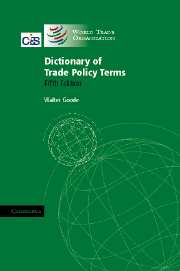Summary
Backdoor protectionism: the use of measures such as unreasonable product standards or excessively stringent quarantine rules to reduce the flow of imports. Ostensibly, such requirements are imposed to protect the public interest and, sometimes to their surprise, the consumers. See also protectionism, sanitary and phytosanitary measures and technical barriers to trade.
Backloading: the practice of ensuring that liberalizing commitments do not fall due until late in whatever phase-in period has been agreed in trade negotiations. It may also refer to deferring mandatory trade liberalization under an agreement or arrangement until the last possible legally acceptable moment. See also frontloading.
Back-to-back investigation: sometimes used to describe the initiation of an anti-dumping or countervailing investigation immediately after another investigation involving the same product has been terminated. See also anti-dumping measures and countervailing duties.
Balance of advantages: a principle sometimes used in multilateral trade negotiations which holds that advantages derived from the exchange of concessions in trade negotiations should be broadly balanced among participants. The balance is usually achieved through the requests-and-offers technique. This principle is not based on economic theory. Its ultimate basis is the fallacious assumption that trade liberalization entails a cost to the liberalizing country. See also mercantilism.
Balance of concessions: a judgement WTO members make in the course of negotiations and on their conclusion about the relative value of what they sought and were given.
- Type
- Chapter
- Information
- Dictionary of Trade Policy Terms , pp. 48 - 68Publisher: Cambridge University PressPrint publication year: 2007



